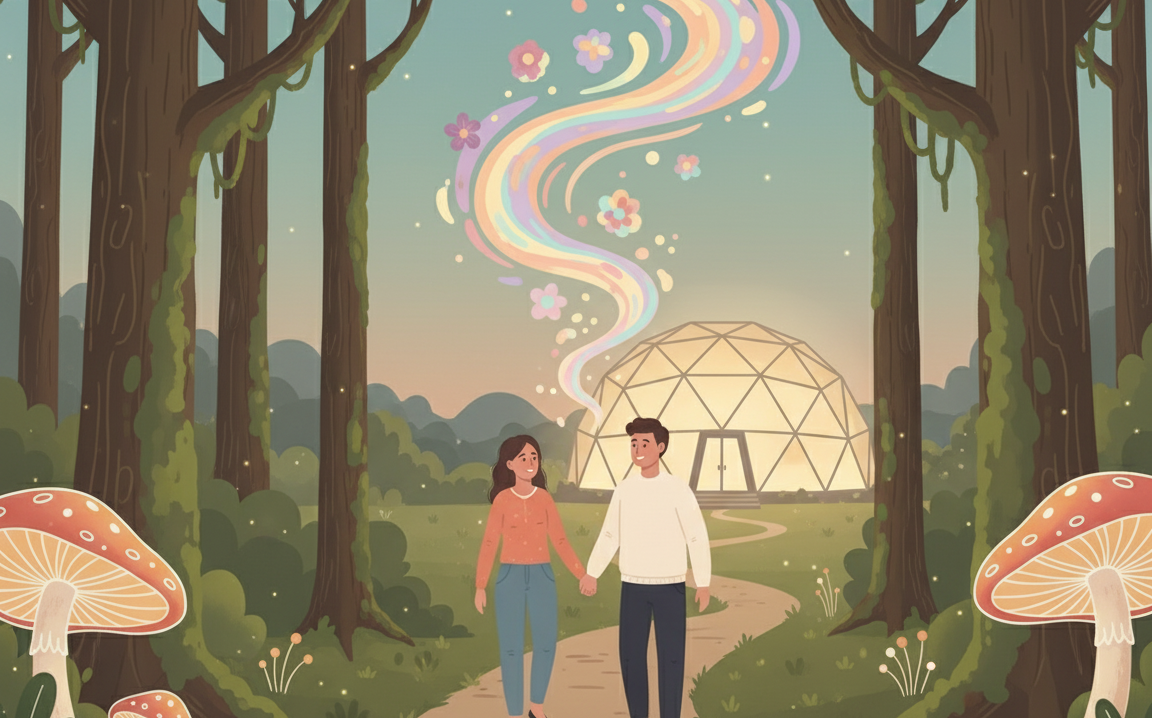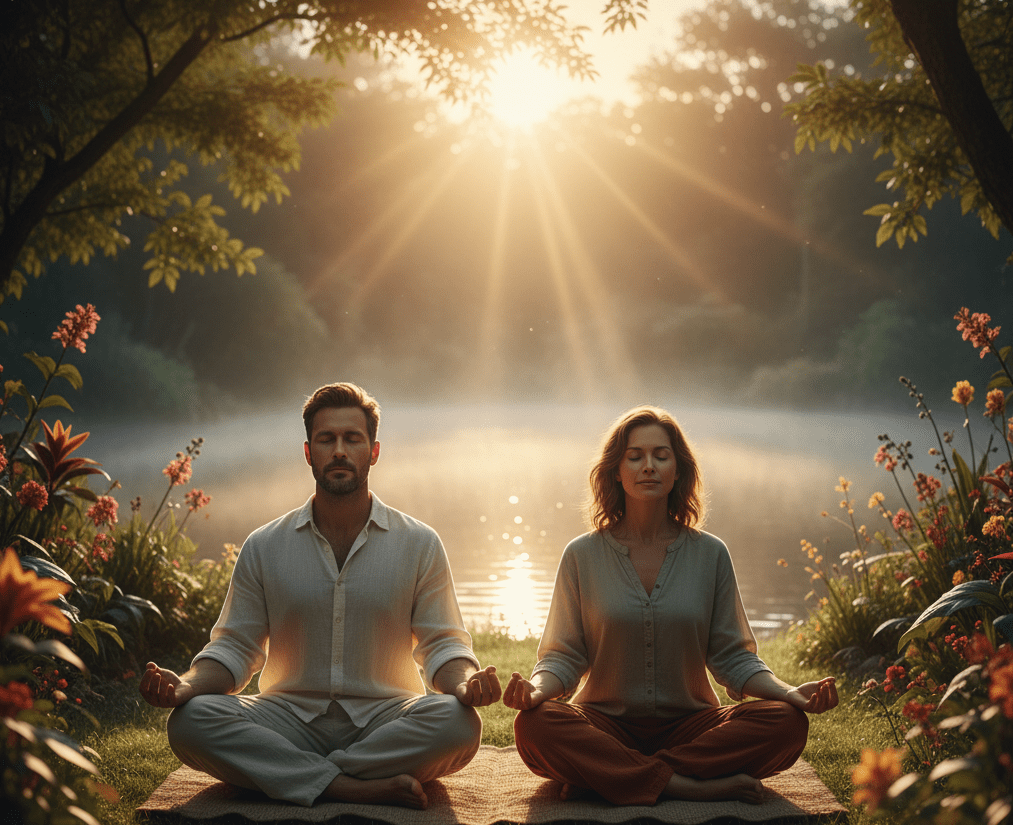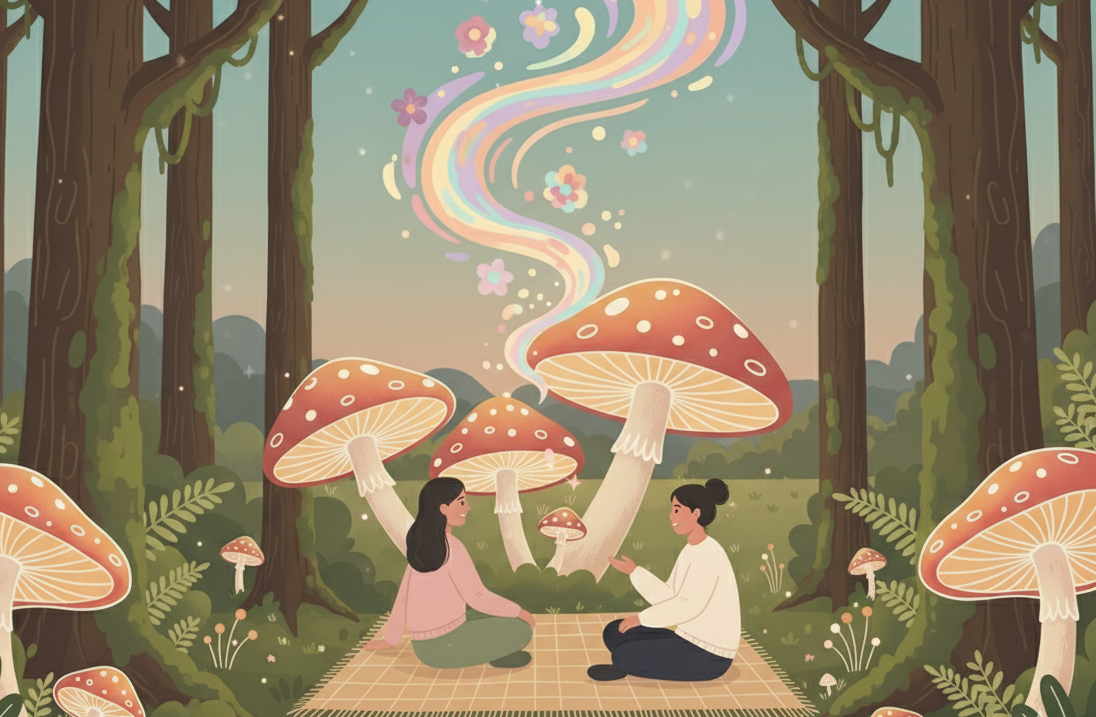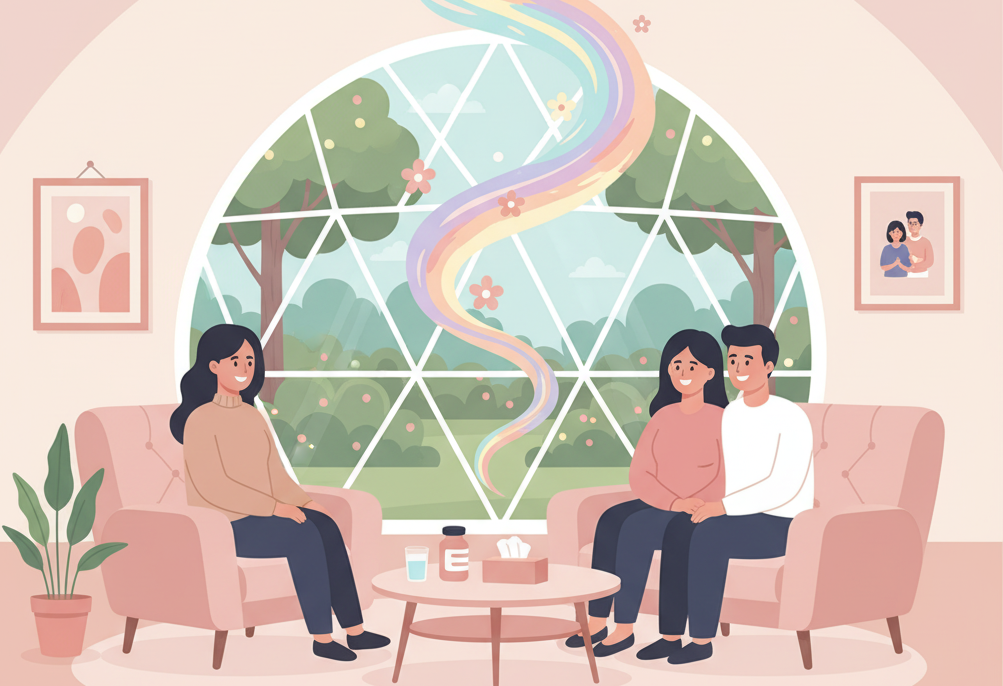
Psychedelic Couples Therapy Retreats: How Shared Journeys Can Heal Relationships
Relationships take work, and more adults are acknowledging and admitting to the need for interventions like couples therapy. A small survey of 1,100 Americans, conducted by Verywell Mind, found that 1 in 10 participants are actively participating in couples therapy and 22 percent are considering it. As treatment becomes less taboo, alternative offshoots begin to arise, and one of those is psychedelic couples therapy retreats.
These programs, offered legally in select countries, are guided psilocybin journeys specifically structured for partners. They’re formatted based on scientific principles that help clients connect, rediscover empathy, feel emotionally safe, and then apply those internal discoveries in real-world practice.
For couples seeking to renew trust or explore new dimensions of intimacy, psychedelic retreats offer a unique, evidence-informed pathway that blends psychological insight with awe and compassion.
What Is a Psychedelic Couples Therapy Retreat?
A psychedelic couples retreat is not “couples therapy” in the traditional sense. Instead, it’s a facilitated (and legally compliant) experience for couples to explore their intentions together under the guidance of trained facilitators.
Facilitators do not diagnose or treat couples; they create a safe space (called a “container” in the psychedelic community) to help the partners communicate with each other openly and curiously, void of defensiveness.
At a high level, the entire experience consists of a few phases. First, participants spend several weeks preparing for the retreat. Then, they attend the ceremony (this is the psychedelic portion of the process), sometimes more than one. Afterwards, they engage in post-retreat integration, a process of applying the insights gained from their ceremony to their relationship.
Each of these phases—preparation, ceremony, and integration—is vital. Preparation builds trust and intention. The ceremony offers perspective and connection. And integration helps transform temporary insight into lasting relational change.
These retreats are only allowed to operate in countries where the distributed psychedelics are legal, such as:
- The Netherlands: psilocybin truffles (not to be confused with mushrooms) are legal to sell and use under facilitation.
- Jamaica: psilocybin mushrooms are unregulated and legal for ceremonial use.
- Costa Rica and Mexico: plant medicine retreats are available under cultural or wellness exemptions.
How Psychedelics Create Connection
Under the influence of psilocybin, many couples describe seeing their partner “as if for the first time” without resentment or defensiveness clouding their view. Psychedelics can help dissolve perceptions of the experiences that cause them to, metaphorically, hold each other at arm’s length instead of in a loving embrace. As one retreat participant put it:
“We came to fix our relationship. Instead, we fell in love again, with the truth of who we already are.”
Emerging science is starting to explain why psychedelics seem to open relational pathways that talk therapy sometimes can’t. Here are some ways that taking psychedelics (in a safe, legal, and well-regulated setting) can facilitate better connection between couples.

They Enhance Emotional Openness
Neuroscientist Robin Carhart-Harris and colleagues have shown that psilocybin temporarily quiets the brain’s default mode network, which houses one’s ego. When this network relaxes, people often describe feeling more emotionally open and less defensive. In practice, that openness can translate into moments of vulnerability and forgiveness between couples that may have been buried underneath years of conflict.

They Heighten Empathy
Research on MDMA-assisted therapy, particularly the Phase 3 clinical trials by MAPS (Multidisciplinary Association for Psychedelic Studies), has shown increases in empathy and trust. While MDMA is still a controlled substance in most countries, psilocybin has been observed to, anecdotally, demonstrate similar effects, like increased eye contact, emotional resonance, and perspective-taking.
They Increase Neuroplasticity
After a psychedelic experience, the brain has been shown to enter a temporary state of heightened neuroplasticity, which is a fancy word to describe the process by which the brain can further grow and develop. In the context of a couples retreat, this means potentially replacing certain behavior patterns with new ones that are more productive for one’s relationship.
Why Retreat Settings Amplify the Experience
There are a lot of factors that play into the type of experience you have taking psychedelics—whether solo or with your partner. These drugs are powerful, and taking them casually can lead to mental harm and/or a frightening experience.
Retreats offer an ideal “set and setting”, a term used to describe a person’s mental state and their physical environment. Both set and setting are vital components of a successful and productive psychedelic journey.
Most reputable retreats provide:
- Medical screening for contraindications (SSRIs, heart conditions, bipolar I, psychosis history).
- Facilitator guidance throughout the journey.
- Nature immersion, which supports calm and reflection.
- Integration sessions to help partners turn insights into action.
Beckley’s Approach to Psychedelic Couples Retreats
Rooted in the pioneering research of the Beckley Foundation, which has collaborated with institutions like Imperial College London and Johns Hopkins, Beckley Retreats brings decades of psychedelic science into real-world wellbeing programs. Here’s a look at what makes Beckley a leader in the psychedelic retreat space.
Program Structure
Couples begin with several weeks of guided preparation, including video sessions and journaling exercises. The retreat itself includes legal psilocybin truffle ceremonies in the Netherlands, supported by mindfulness, yoga, and group integration.
After returning home, participants receive structured support to help with the integration process. This support includes follow-up calls and community circles to help sustain connection. Although hard conclusions haven’t been drawn in clinical settings, some research that relies on self-reported outcomes highlights the importance of post-psychedelic integration. A 2025 study, published in the Journal of Psychedelic Studies, “recorded substantial interest in integration support following naturalistic psychedelic experiences for people with substance use concerns.”
Facilitators and Safety
Beckley facilitators are trauma-informed professionals trained in relational and transpersonal psychology. Medical screening is thorough, with clear guidance on contraindications. An emphasis is placed on every participant’s emotional safety, consent, and communication. During couples retreats, sessions may include:
- Guided communication exercises.
- Shared intention setting and reflection.
- Partner-assisted integration practices.
- Gentle somatic or breathwork modalities.
As Beckley’s facilitators often say: “The medicine opens the heart; integration keeps it open.”
How Beckley Compares to Other Couples Retreat Options
Below is a snapshot of how Beckley’s approach aligns with other prominent legal psychedelic programs serving couples:
| Retreat | Legal Substance | Format | Integration Depth | Facilitator Expertise | Couples Focus |
|---|---|---|---|---|---|
| Beckley Retreats (Netherlands) | Psilocybin truffles (legal) | Multi-week arc (prep + 5-day retreat + post-integration) | Robust: multi-session follow-up, peer community | Therapists, trauma-informed facilitators | High – structured for couples |
| Inwardbound (Ireland/Portugal) | Psilocybin truffles (legal) | 5-day immersive | Strong: therapist-led integration | Licensed psychotherapists | Yes – small-group or private |
| MycoMeditations (Jamaica) | Psilocybin mushrooms (legal) | 7-day oceanfront | Moderate: optional coaching | Mixed clinical + wellness | Partial – couples-friendly |
| Behold Retreats (Netherlands/Costa Rica) | Psilocybin or ayahuasca (legal regionally) | Private or small group | Variable – coaching add-ons | Wellness coaches, therapists | Optional |
| Tandava Retreats (Mexico) | 5-MeO-DMT (legal) | 4-day private or small-group | Moderate | Trauma-informed 5-MeO facilitators | Yes, but high intensity |
What Makes Beckley Different:
- Scientific Lineage: Founded with ties to the Beckley Foundation’s psychedelic research collaborations.
- Safety-first Design: Comprehensive screening and on-site medical support.
- Structured Integration: Multi-week framework ensures insights become habits.
- Relational Intelligence: Explicit focus on empathy, communication, and relational healing—not just “shared trips.”
Choosing the Right Psychedelic Couples Retreat
Not every retreat is right for every couple. Here’s a quick checklist of what to look for in a retreat:
- Legality: Ensure the program operates where the psychedelic substance is legal (e.g., psilocybin truffles in the Netherlands).
- Safety: Look for medical screening, facilitator ratios, and emergency protocols.
- Facilitator Backgrounds: Are they therapists, coaches, or spiritual guides? Transparency matters.
- Integration Support: How long does post-retreat support last? Do they offer a single call or a full program?
- Relational Fit: Some retreats focus more on individual healing; others center on couple exercises.
Don’t forget to align your intentions with your partner. This is a joint experience, not a journey that your partner is tagging along on. The clearer the “why,” the deeper the experience.
Are Psychedelic Retreats Legal for Couples?
Yes, depending on where you go.
Take the Netherlands, for example. Under Dutch law, magic mushrooms, which contain psilocybin, are illegal to possess, sell, and consume. But it is legal to ingest the psychedelic compound from the truffle portion of those mushrooms since they exist underground. It’s a legal loophole that allows for the safe and regulated existence of psilocybin retreats in the Netherlands and the furtherance of psychedelic research.
In the Netherlands, psilocybin truffles (which are like the underground nutrient storage units of the fungus) are legal to sell and consume under Dutch law. These contain the same active compounds—psilocybin and psilocin—as magic mushrooms, which themselves are prohibited.
In Jamaica, psilocybin mushrooms are unregulated and openly used in wellness retreats. Costa Rica and Mexico allow plant-based medicines like ayahuasca or 5-MeO-DMT, but only under specific cultural and legal frameworks.
However, psychedelic use remains illegal in most other regions. Couples should only attend retreats that operate entirely within local law and uphold strict ethical standards.
The Future of Psychedelic Couples Work
The movement toward legal, research-informed psychedelic healing is accelerating. While MDMA-assisted therapy awaits regulatory approval, psilocybin research continues to illuminate how altered states can foster emotional attunement and resilience.
Forward-thinking organizations like Beckley Retreats bridge that gap, bringing evidence-based practices into legal, non-clinical settings that honor both science and spirit.
For couples navigating change, loss, or disconnection, these retreats aren’t an escape; they’re a return: to presence, compassion, and possibility.
FAQs
What is a psychedelic couples therapy retreat?
A psychedelic couples therapy retreat is a guided, legally compliant program where partners explore consciousness and connection together using substances like psilocybin truffles. Rather than offering clinical “therapy,” these retreats focus on creating a safe, supported space for emotional healing, empathy, and shared insight with professional facilitators leading preparation, ceremony, and integration.
Are psychedelic retreats legal for couples?
Yes, but only in certain countries. In the Netherlands, psilocybin truffles (not mushrooms) are legal and can be used safely in licensed retreat settings. Jamaica also allows psilocybin mushrooms in wellness retreats. Always confirm that your chosen program operates within local law and follows strict safety and screening protocols.
Can psychedelics really help improve relationships?
Emerging research suggests they can support relational healing when used responsibly. Psilocybin and MDMA have been shown to increase empathy, emotional openness, and communication. In a retreat setting, couples can experience renewed compassion, understanding, and a unifying perspective.
What happens during a psychedelic couples retreat?
A typical retreat includes several weeks of preparation, guided psilocybin (or truffle) ceremonies led by trained facilitators, and structured post-retreat integration. Couples learn communication tools, share intentions, and process their experiences together. The goal is to turn insights from the journey into lasting relational growth.
How do I choose a safe psychedelic retreat for my partner and me?
Look for programs that combine legality, thorough screening, and experienced facilitators, ideally with backgrounds in psychology or trauma-informed care. The best retreats, like Beckley Retreats, offer multi-week preparation and integration support to help couples stay grounded and apply their insights after returning home.
Sources
- R.L. Carhart-Harris, D. Erritzoe, T. Williams, J.M. Stone, L.J. Reed, A. Colasanti, R.J. Tyacke, R. Leech, A.L. Malizia, K. Murphy, P. Hobden, J. Evans, A. Feilding, R.G. Wise, & D.J. Nutt, Neural correlates of the psychedelic state as determined by fMRI studies with psilocybin, Proc. Natl. Acad. Sci. U.S.A. 109 (6) 2138-2143, https://doi.org/10.1073/pnas.1119598109 (2012).
- Mitchell, J.M., Bogenschutz, M., Lilienstein, A. et al. MDMA-assisted therapy for severe PTSD: a randomized, double-blind, placebo-controlled phase 3 study. Nat Med 27, 1025–1033 (2021). https://doi.org/10.1038/s41591-021-01336-3
- Shao LX, Liao C, Gregg I, Davoudian PA, Savalia NK, Delagarza K, Kwan AC. Psilocybin induces rapid and persistent growth of dendritic spines in frontal cortex in vivo. Neuron. 2021 Aug 18;109(16):2535-2544.e4. doi: 10.1016/j.neuron.2021.06.008. Epub 2021 Jul 5. PMID: 34228959; PMCID: PMC8376772.
- Helder, Sophie & Siefried, Krista & Acheson, Liam & Steele, Maureen & Harrod, Mary & Brett, Jonathan. (2025). Exploring the perceived usefulness of integration support after naturalistic psychedelic experiences in people concerned about their substance use: A survey. Journal of Psychedelic Studies. 9. 234-246. 10.1556/2054.2025.00422.


